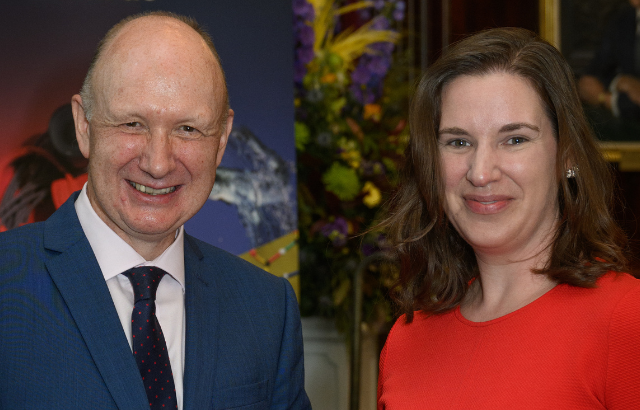Blizard Institute colleagues celebrated at the inaugural Research and Innovation Awards
Queen Mary University of London held its first Research and Innovation Awards on Thursday 25 May, to recognise the excellent people and teams that make creative, dynamic, and world-class research and innovation possible at the University.

Dr Rosalind Hannen (right) receiving her Research and Innovation Award from President and Principal Professor Colin Bailey (left)
The Blizard Institute was well represented among the winners on the night, with colleagues and collaborators taking three of the awards up for grabs. Another Blizard-affiliated collaborative also came highly commended among the nominees.
Professor Mary Collins, Director of the Blizard Institute, said: “I am so proud of all from Blizard who were nominated. To have so many winners was icing on the cake”.
A full list of winners and highly commended nominees is available on the Queen Mary news pages.
Winners from the Blizard Institute
Excellent Research Support
Dr Faiza Durrani of East London Genes & Health received the award for Excellent Research Support for her work in helping to engage South Asians in research.
Genes & Health led by Queen Mary is one of the world’s largest community-based genetics studies, aiming to improve health among people of Pakistani and Bangladeshi heritage by analysing the genes and health of 100,000 local people. South Asian people have some of the highest rates of heart disease, diabetes, and poor health in the UK. Genes & Health was set up to help fight against these and other major diseases.
East London Genes & Health was the first branch to be established in 2015, with the Bradford and Manchester branches joining in 2019 and 2022 respectively. In 2022 the study hit a key milestone with 50,000 research volunteers participating nationally – halfway to their 100,000 goal.
Dr Faiza Durrani said: "I’m grateful and honoured to be part of such a rewarding and passionate team where we are making a real difference to the local South Asian community. I’m humbled to win this award which reflects the incredible teamwork and results we have been achieving".
Research Impact – culture civic and community
The SHARE Collaborative led by Professor Chloe Orkin received one of the awards for Research Impact in the category of culture civic and community for their role in guiding the global public health response to the 2022 mpox outbreak. The SHARE Collaborative was also high commended among nominees for the Excellent interdisciplinary research project award category, and the only group who were recognised in two categories.
The SHARE Collaborative for health equity investigate inequities that lead to poor health outcomes in HIV, sexual health and COVID-19 especially in minoritised communities.
They turned their attention to mpox during the outbreak conducting vital research into the disease. The researchers published a case series which provided the most comprehensive picture of the mpox outbreak happening across the world at the time, through which they identified new clinical symptoms of monkeypox in men. The study proved influential in shaping international case definitions, thereby contributing to the global response to mpox. They also published the first case study series of mpox infection in cisgender (cis) and transgender (trans) women and non-binary individuals assigned female at birth. Those groups had not been studied during the multi-country outbreak.
A further case series identified a severe form of mpox with high mortality in people with advanced HIV. This form of disease has since been designated an opportunistic infection by the and Center for Disease Control . The authors have called for this form of mpox be added to the World Health Organization list of severe infections that are considered particularly dangerous to people with advanced HIV disease. They also recommend that all people with mpox be tested for HIV.
Professor Chloe Orkin said: “We are proud to have mobilised quickly through effective collaboration with international research colleagues and members of affected communities. This allowed us to make an impactful multidisciplinary contribution to the mpox response both globally and locally. As new cases are occurring this summer, we will continue to work with the World Health Organization on commissioned research and with other stakeholders to evaluate the issue of post-vaccination re-infection and the role of vaccination in curbing the multi-country outbreaks.”
Research Impact – enterprise and commercial innovation
Dr Rosalind Hannen received the second Research Impact award of the night, this time in the category for enterprise and commercial innovation. She developed a new technology to sustain human skin tissue to eliminate preclinical testing errors.
Ros is the Founder and CEO of Keratify, a Queen Mary spinout company which offers “high-fidelity skin testing with unparalleled maintenance of skin barrier integrity.” Current human skin models are not able to fully maintain or replicate the barrier function of skin in the laboratory. Human skin tissue in the lab deteriorates quickly, which led to the company reconsidering human skin culture methodology and create an effective way of maintaining human skin in the laboratory.
Congratulations to all the winners and those nominated across the Blizard Institute, Faculty of Medicine and Dentistry and the wider University.